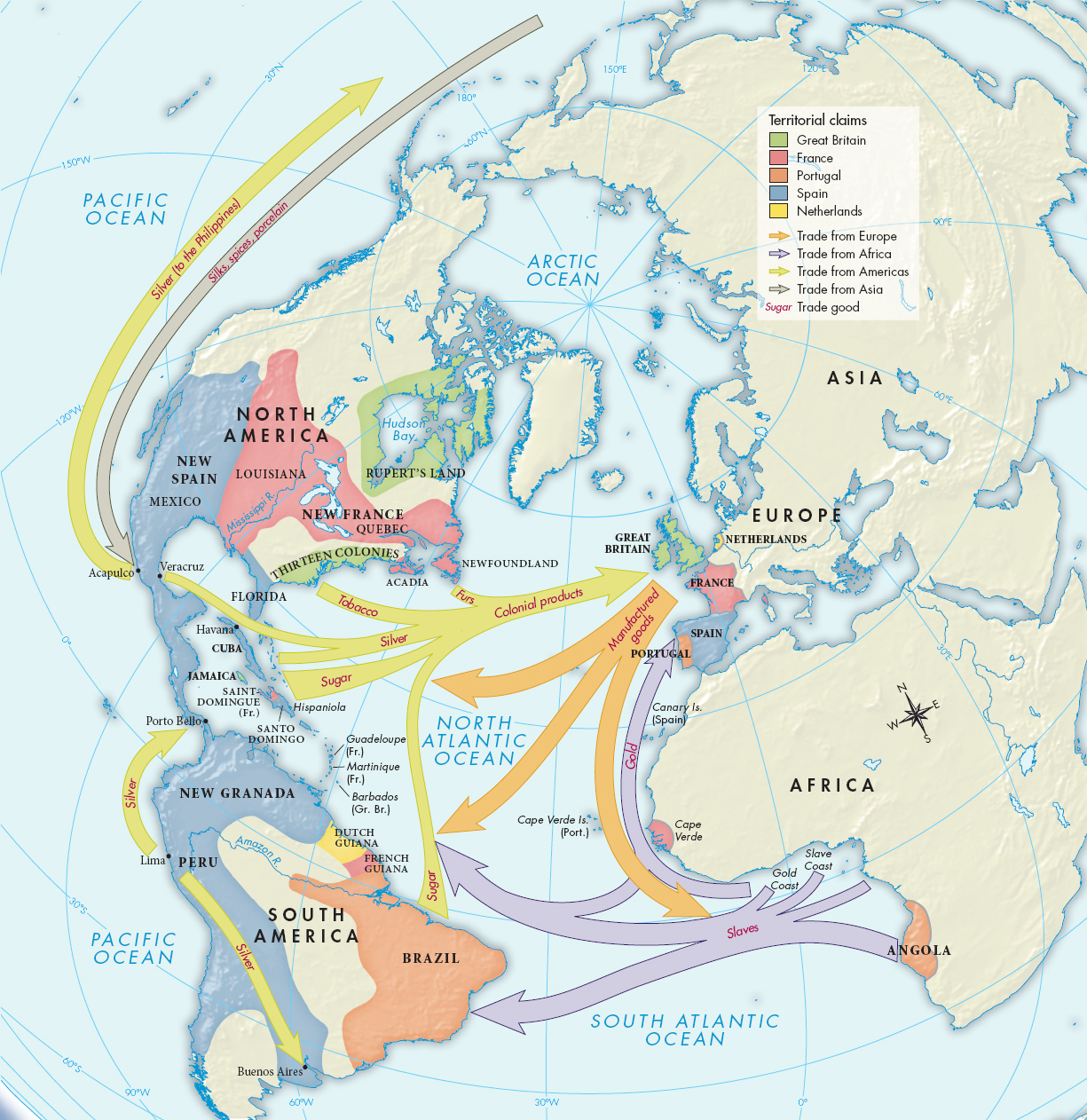Understanding Western Society
Printed Page 533
Chapter Chronology
Mercantilism and Colonial Competition
Britain’s commercial leadership in the eighteenth century had its origins in the mercantilism of the seventeenth century (see "Louis XIV's Wars" in Chapter 15). European mercantilism was a system of economic regulations aimed at increasing the power of the state. As practiced by a leading advocate such as Colbert under Louis XIV, mercantilism aimed particularly at creating a favorable balance of foreign trade in order to increase a country’s stock of gold. A country’s gold holdings served as an all-important treasure chest that could be opened periodically to pay for war in a violent age.
In England, the desire to increase both military power and private wealth resulted in the mercantile system of the Navigation Acts. Oliver Cromwell established the first of these laws in 1651, and the restored monarchy of Charles II extended them in 1660 and 1663. The acts required that most goods imported from Europe into England and Scotland (Great Britain after 1707) be carried on British-owned ships with British crews or on ships of the country producing the article. These laws gave British merchants and shipowners a virtual monopoly on trade with British colonies. The colonists were required to ship their products on British (or American) ships and to buy almost all European goods from Britain. It was believed that these economic regulations would eliminate foreign competition, thereby helping British merchants and workers as well as colonial plantation owners and farmers. It was hoped, too, that the emerging British Empire would develop a shipping industry with a large number of experienced seamen who could serve when necessary in the Royal Navy.
The Navigation Acts were a form of economic warfare. Their initial target was the Dutch, who were far ahead of the English in shipping and foreign trade in the mid-seventeenth century (see Chapter 15). In conjunction with three Anglo-Dutch wars between 1652 and 1674, the Navigation Acts seriously damaged Dutch shipping and commerce. By the late seventeenth century the Dutch Republic was falling behind England in shipping, trade, and colonies.
Thereafter France stood clearly as England’s most serious rival in the competition for overseas empire. Thus, from 1701 to 1763, Britain and France were locked in a series of wars to decide, in part, which nation would become the leading maritime power and claim the profits of Europe’s overseas expansion (Map 17.2).

MAP 17.2
The Atlantic Economy in 1701The growth of trade encouraged both economic development and military conflict in the Atlantic basin. Four continents were linked together by the exchange of goods and slaves.
The first round was the War of the Spanish Succession (see "Louis XIV's Wars" in Chapter 15), which started in 1701 when Louis XIV accepted the Spanish crown willed to his grandson. Besides upsetting the continental balance of power, a union of France and Spain threatened to encircle and destroy the British colonies in North America. Defeated by a great coalition of states after twelve years of fighting, Louis XIV was forced in the Peace of Utrecht (YOO-trehkt) in 1713 to cede his North American holdings in Newfoundland, Nova Scotia, and the Hudson Bay territory to Britain. Spain was compelled to give Britain control of its West African slave trade and to let Britain send one ship of merchandise into the Spanish colonies annually.
Conflict continued among the European powers over both domestic and colonial affairs. The War of the Austrian Succession (1740–1748), which started when Frederick the Great of Prussia seized Silesia from Austria’s Maria Theresa (see "Frederick the Great of Prussia" in Chapter 16), gradually became a world war that included Anglo-French conflicts in India and North America. The war ended with no change in the territorial situation in North America. This inconclusive standoff helped set the stage for the Seven Years’ War (1756–1763; see "The Seven Years' War" in Chapter 19). In central Europe, France aided Austria against the Prussians, who had formed an alliance with England. In North America, French and British settlers engaged in territorial skirmishes that eventually resulted in all-out war that drew in Native American allies on both sides of the conflict (see Map 19.1). By 1763, Prussia had held off the Austrians, and British victory on all colonial fronts was ratified in the Treaty of Paris. Britain had realized its goal of monopolizing a vast trading and colonial empire.
